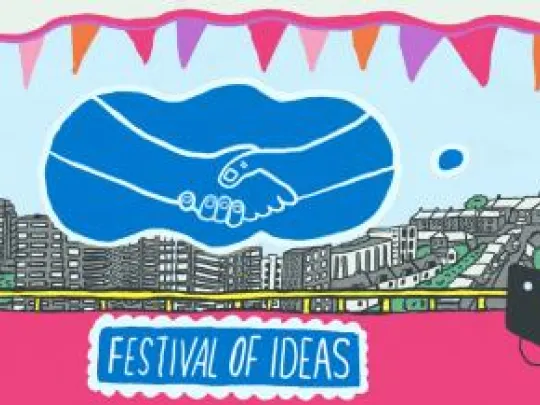
Key information
Publication type: General
Publication date:
Contents
1. Introduction
1.1 What is the London Festival of Ideas?
The Festival of Ideas will explore our individual and collective visions and plans for strong communities in London.
The last year has shown how much amazing activity is taking place across London to support communities, and we know many organisations are actively thinking about what the future holds. We are inviting everyone to be involved and this toolkit will aim to support you in shaping your own event, conversation or activity so you can be part of the London Festival of Ideas.
The festival is an opportunity to join up all of this activity, and bring together London’s community and faith organisations, its activists and artists, its social businesses and civic universities, as well as the individuals and networks exploring new ways of caring for each other and the world around them.
We are also offering access grants of up to £500 to support organisations who face barriers to participation to host an activity as part of the festival. Find out more about the access grants.
You can read more about the aims of the Festival and how it is contributing to the Building Strong Communities Mission.

2. Festival theme
We are inviting everyone to be involved, to host activities, events, conversations and celebrations which are designed with your community in mind. These events should be responding to the festival theme of Building Strong Communities.
When we imagine strong communities, what do they look like and where do they exist? What are the hubs that bring communities together, support them to participate and engage? What is needed to build and grow strong communities together?
The theme is the golden thread across all the activities taking place throughout the Festival month. All event hosts will be asked to feedback the insights generated from their events (more detail in section 4 - Sharing insights), and this will allow us to build up a shared picture of what we can collectively achieve.

2.1 Imagining Strong Communities:
We want to know how you understand and imagine strong communities. We are interested in hearing from all communities - whatever it is that brings you together whether that be communities of place, identity or activity. We recognise that Londoners belong to multiple communities at any one time, and hope to represent the different ways people come together.
Prompt questions for imagining strong communities:
- What does it look like?
- What do you already do that contributes to it?
- What more do you want to do? What would help you achieve this? E.g. skills, capacity, needs, connections etc.
- What are the barriers to building this strong community?
2.2 Where do your community/ies...?
We want to understand what a community hub means to Londoners. At their core ‘hubs’ go beyond physical spaces and are about providing Londoners with access to support, knowledge and the ability to participate confidently in community life.
Tell/show us how, when and where your communities:
- Come together and have a sense of belonging
- Network and participate in community life
- Access support and services
- Learn and develop ideas
2.3 Building Strong Communities together:
In thinking about how we come together to build strong communities - how do you connect with other groups in London beyond your community/ies - what is it you want to connect on and learn from and with others and what can you give? How do you think we can collectively deliver that? In the context of limited resources, how can we think creatively and collectively to achieve this?
Prompt questions for building strong communities together:
- Who do you need to work with to build strong communities?
- How can you connect with other groups in London?
- How can you collaborate with other groups in London?
- What can you commit to contribute to building strong communities?
3. How to get involved
We’re looking to hear from all communities, whether that be communities of place, identity or activity - you may be a pan-London faith group, an South London residents association or a creative online collective - we want to hear from you and your community.
3.1 Submit your proposal
If you have an event idea or would like to take part in the festival, you can submit your initial proposal through this form, or if you are a group with a turnover of less that £75,000 you can apply for up to £500 to help run your event.
Every week we will review proposals and applications and confirm if your submission meets the criteria for the festival. Only complete one form, if you are not sure which one is the right one for you check the grant prospectus or get in touch with us at [email protected]
3.2 Deadlines
The deadline for applying for funding is 4 June and for submitting event proposals is 12 June. This is the final date for submitting event proposals. We know that you might not know the full details of your event, which is why we are only asking for basic information about your proposal.
Once your event is accepted you then be able to adapt and finalise the event as the festival gets closer.
Final event details will need to be submitted to us a minimum of 7 working days before your activity is planned, so that we can get your event uploaded onto the listings page.
3.3 Criteria
When you submit an event proposal we’ll check it against the following criteria for inclusion in the festival. The Festival of Ideas partnership group will review all entries and either approve, reject or ask for changes to event proposals within a week of submissions based on the following basic criteria:
- Does the proposal align with this year’s theme?
- From the text provided, is the event proposal clearly explained? Would a public audience have a clear understanding of what they can expect from the event?
- Has the organiser considered the diversity of participants (e.g. on panel discussions) and the accessibility to the event (whether physical or digital)?
Once you have received confirmation that your proposal has been accepted, you can use the guidance below to help plan your activity.
3.4 Planning the Activity/Event/Meeting
Decide the goal of the activity - How does your activity respond to the festival themes? Come up with a clear goal and ensure the plan becomes your road map to getting there. Do you want to focus on one of the themes or cover all three?
Decide what type of activity you want to organise - Do you want to organise an online event or forum? Or would you like to take your activity outdoors in accordance with public health guidance? Do you want to focus on celebration, conversation or creativity? Or all three?
Decide who needs to be there - Specify or set a guideline on the reach you want to have. This could be a community of place, interest of activity. Think about the diversity of your community and how you can remove barriers for people attending.
Plan with others - Get your community group involved in planning the event/activity. This can be a great way to develop new leaders and get other people more invested in the success of the activity you are planning.
Consider accessibility needs of participants
- If you are hosting your event online, a number of virtual platforms have built in accessibility tools. If you are using a British Sign Language interpreter, make sure they are pinned on the screen so they can be seen by deaf participants throughout the event.
- Build in breaks into your event to prevent fatigue.
- If you are planning to meet in person, make sure you choose an accessible venue. Think about transport links, accessible routes, lifts, movement inside the venue, accessible toilets and room setup.
- Make sure to include accessibility information on your event page.
- Ask participants when they register if they have any accessibility requirements – this might include dietary restrictions, interpreting services, accessible parking or seating. You can also include an open text box asking about any other steps that will help support full participation.
Digital Safeguarding - If you are hosting your event virtually check out our checklist for digital safeguarding
If you are hosting your activity online consider what activities or online tools you might want to use to help engage people.
- Jamboard - is a digital interactive whiteboard used for online collaboration using Google Workspace.
- Mentimeter - is a tool that enables people to have more interactive meetings with live polls, word clouds and quizzes.
- Microsoft forms - is a simple way to easily create surveys, quizzes, and polls
- Survey Monkey - is an online survey software that helps you to create and run online surveys.
- Miro - is an online collaborative whiteboarding platform that enables distributed teams to work effectively together, from brainstorming with digital sticky notes to planning and managing workflows.
- Slido - is an easy-to-use Q&A and poling platform for live or remote meetings.
4. Sharing insights
The festival is an opportunity to join up all communities and activities taking place across London. In order to do that we will ask all activity hosts to feedback a summary of what they learned about the festival themes through their events. This is so that we can weave together all the ideas, insights, resources that are generated and share them back with everyone.
We hope this will help build up a picture of our collective visions for strong communities and how we can work together to make them reality. We are creating a webform that you can use to submit the insights gathered from your activity, this will be updated by June 11.